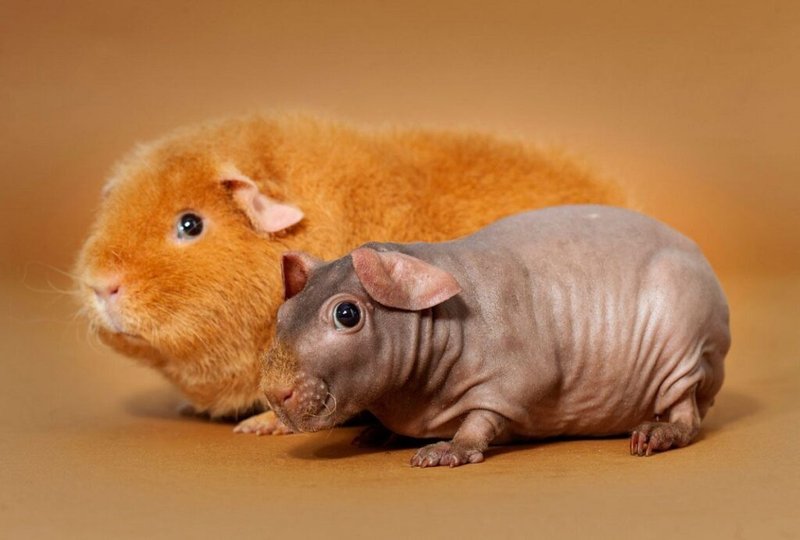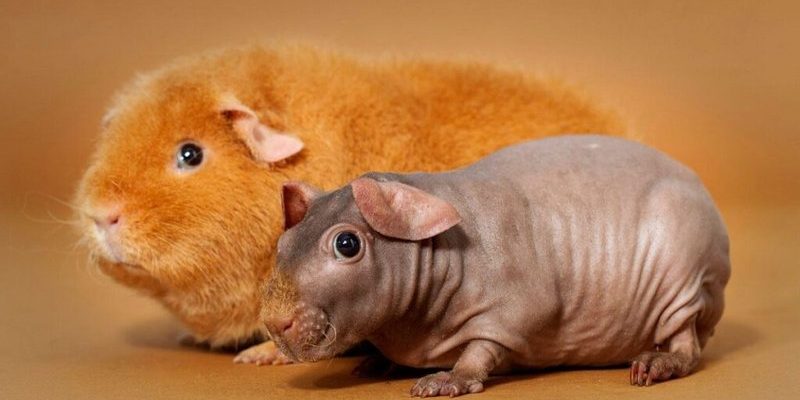
Just like any pet, Skinny Pigs come with their own set of quirks and care requirements. They might be adorable, but they also need attention, care, and some special considerations. In this article, we’ll explore everything you need to know before bringing one of these naked cuties into your life. So grab a comfy seat, and let’s chat about the ins and outs of having a Skinny Pig as your new companion.
What Is a Skinny Pig Guinea Pig?
Skinny Pigs are a breed of guinea pig that is mostly hairless, except for some sparse fur on specific parts of their bodies, like their noses and feet. This breed was developed in the late 1970s in Canada, mainly for research purposes. Fast forward to today, and they’ve become popular pets due to their gentle temperament and unique look.
You might be wondering why someone would want a hairless pet. Well, alongside their cute appearance, Skinny Pigs tend to have fewer allergies for potential owners. That’s right—if the thought of fur flying around your home gives you the heebie-jeebies, these little guys could be the answer you’re looking for.
Another fascinating aspect of Skinny Pigs is their personality. They’re known for being friendly and social, which makes them great companions. But remember, every pet comes with its own personality quirks, so it’s essential to understand their behaviors before making a commitment.
Pros of Owning a Skinny Pig
When it comes to pets, there’s a lot to love about Skinny Pigs. Here are some of the top advantages of adding one of these adorable creatures to your family:
- Hypoallergenic: One of the biggest draws of Skinny Pigs is their hairless nature. This trait can make them a better choice for people who have allergies to pet dander. Although no pet is entirely hypoallergenic, the reduced fur can mean less sneezing and watery eyes for some owners.
- Affectionate Companions: Skinny Pigs are known for their friendly and social behavior. They often enjoy interacting with their humans, making them a delightful addition to any household. Their playful nature can lead to plenty of bonding moments!
- Unique Appearance: Let’s be honest, having a pet that stands out is pretty cool! With their wrinkly skin and adorable faces, Skinny Pigs are sure to grab attention. They often become conversation starters for guests.
However, every pet has its ups and downs, and it’s important to take a balanced view.
Cons of Owning a Skinny Pig
While there’s much to love about Skinny Pigs, you should also be aware of some potential downsides. Here are a few things to consider:
- Skin Care Needs: The lack of fur means that Skinny Pigs require special attention to their skin. You’ll need to regularly check for dryness and signs of irritation. They can also be prone to sunburn, so it’s crucial to keep them away from direct sunlight.
- Higher Maintenance: Compared to regular guinea pigs, Skinny Pigs can be a bit more demanding in terms of care. This includes bathing them occasionally and keeping their living environment clean to avoid skin issues.
- Cost of Ownership: Because they’re less common, Skinny Pigs can sometimes be more expensive to adopt or purchase. Additionally, their specialized care needs might increase ongoing costs, including skincare products and vet visits.
It’s essential to weigh these factors carefully. Just like any pet, living with a Skinny Pig requires commitment.
Diet and Nutrition for Skinny Pigs
Feeding a Skinny Pig is similar to feeding any other guinea pig, but with a few considerations. These little guys thrive on a balanced diet! Here’s what you need to know to keep your new friend healthy:
- Hay: Good-quality hay should be the main staple of your Skinny Pig’s diet. Timothy hay is a great choice. It helps with their digestion and keeps their teeth healthy.
- Fruits and Vegetables: Fresh fruits and veggies provide essential vitamins. Think leafy greens like kale or romaine lettuce. Just be careful with treats! You should only offer small amounts of fruits as they can be high in sugar.
- Pellets: High-quality guinea pig pellets are also important. Look for ones that are fortified with Vitamin C, which is crucial for their health.
Here’s the thing: proper diet is critical. Just like us, Skinny Pigs need a balanced diet to stay healthy and happy.
Living Space Requirements for Skinny Pigs
Creating a comfortable living environment for your Skinny Pig is key to their well-being. These little creatures need space to roam and explore, so here’s what to consider:
- Cage Size: A spacious cage is a must. The ideal size for one Skinny Pig is at least 7.5 square feet. This gives them room to move around and includes space for a cozy hiding area.
- Bedding: Use soft, absorbent bedding to keep their living area clean and comfortable. Avoid cedar or pine shavings, as these can be harmful to their respiratory health.
- Temperature Control: Since Skinny Pigs have less insulation, maintaining a stable temperature in their environment is crucial. Keep them in a room that is neither too hot nor too cold, ideally between 65°F and 75°F.
By providing a cozy and safe space, you’ll help your Skinny Pig thrive in their new home.
Health Considerations for Skinny Pigs
Like all pets, Skinny Pigs can face health challenges. Understanding what to look for is important for your pet’s well-being. Here’s what you should keep in mind:
- Skin Issues: Since they don’t have fur, Skinny Pigs can be prone to dry skin and other skin conditions. Regular checks and baths can help prevent problems.
- Respiratory Health: Their respiratory systems can be sensitive. Maintain a clean environment and avoid exposure to smoke or strong chemicals.
- Regular Vet Checkups: Routine vet visits are essential for monitoring their health. Keep an eye on their weight and dietary habits, as obesity can be a concern.
Regular care and attention to health factors can contribute to a long, happy life for your Skinny Pig.
Is a Skinny Pig Right for You?
Bringing a Skinny Pig into your home should be a thoughtful decision. These adorable creatures can bring joy, but they also come with unique responsibilities. Consider your lifestyle and willingness to care for a pet with special needs.
Here are some questions to ask yourself:
- Do I have enough time for daily interaction? Skinny Pigs love company.
- Am I prepared for extra grooming and skin care? Remember, they need more than just regular pet care.
- Can I afford the costs associated with their care? Think about adoption fees, food, bedding, and vet visits.
If you answer “yes” to these questions, then a Skinny Pig could be a delightful addition to your life.
In conclusion, the Skinny Pig guinea pig can be a fantastic pet for the right person. Their cute appearance, friendly nature, and unique characteristics make them stand out. However, owning one requires commitment and a willingness to adapt your lifestyle to meet their needs. By keeping these factors in mind, you can make the best decision for both you and your future furry (or hairless) friend.

